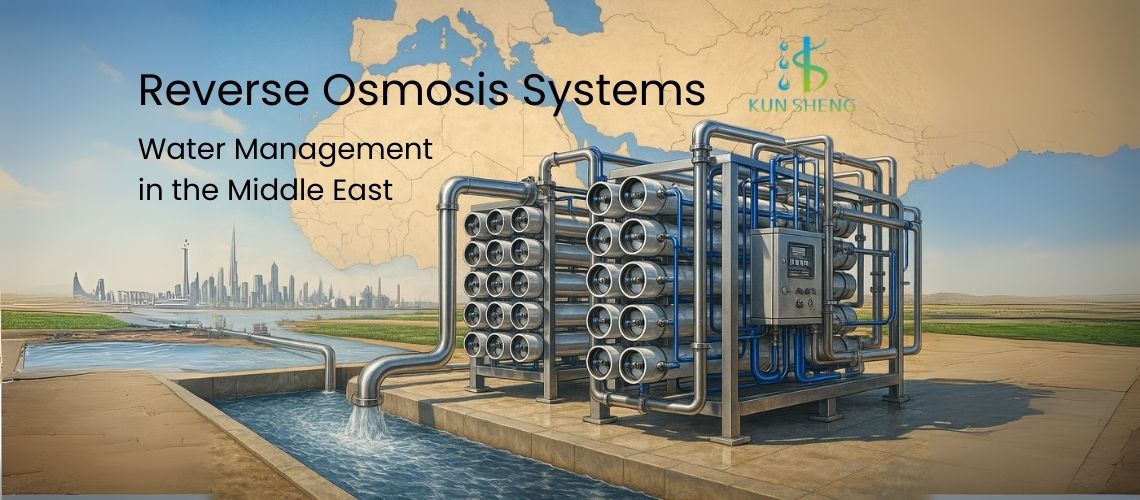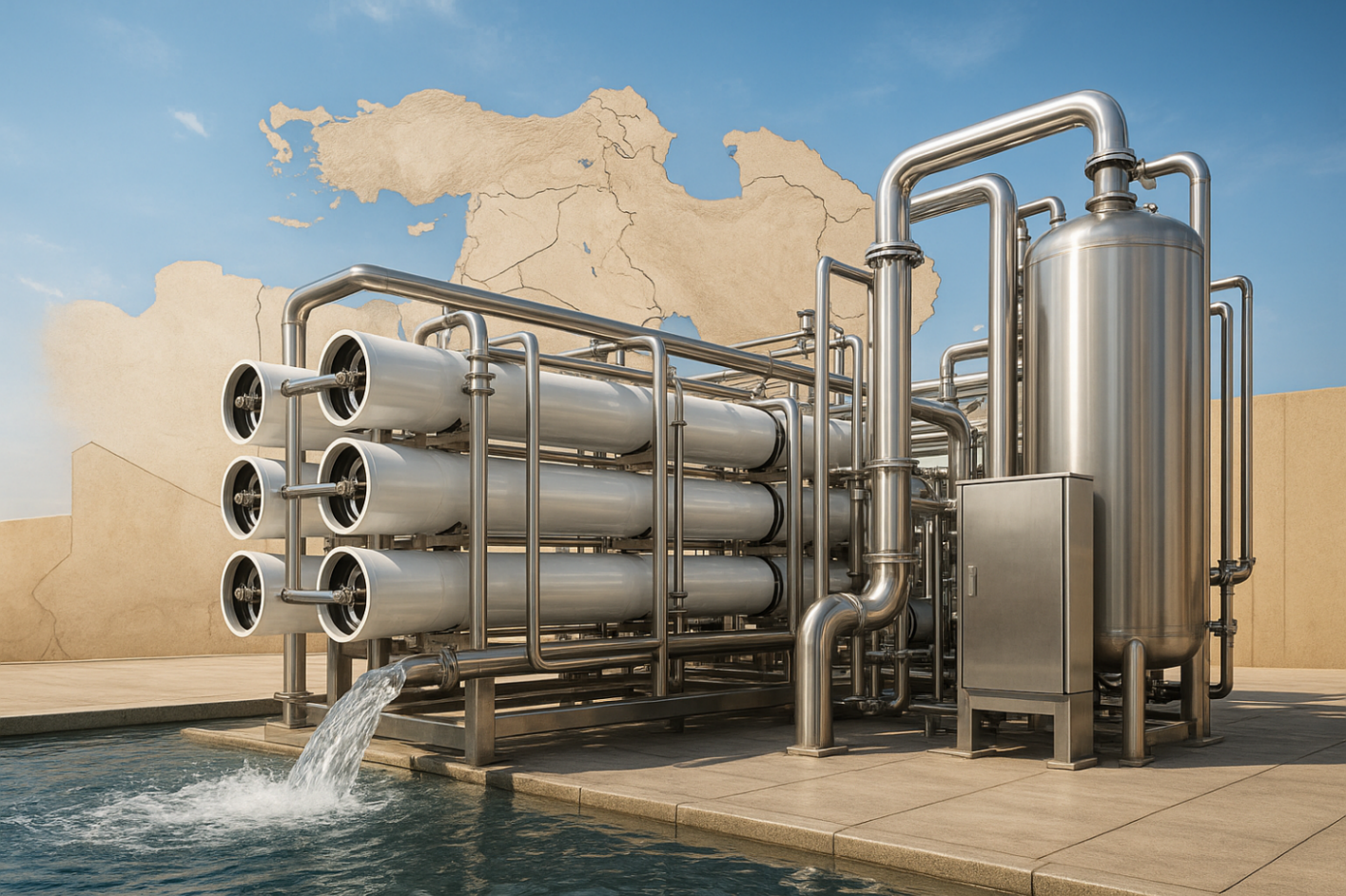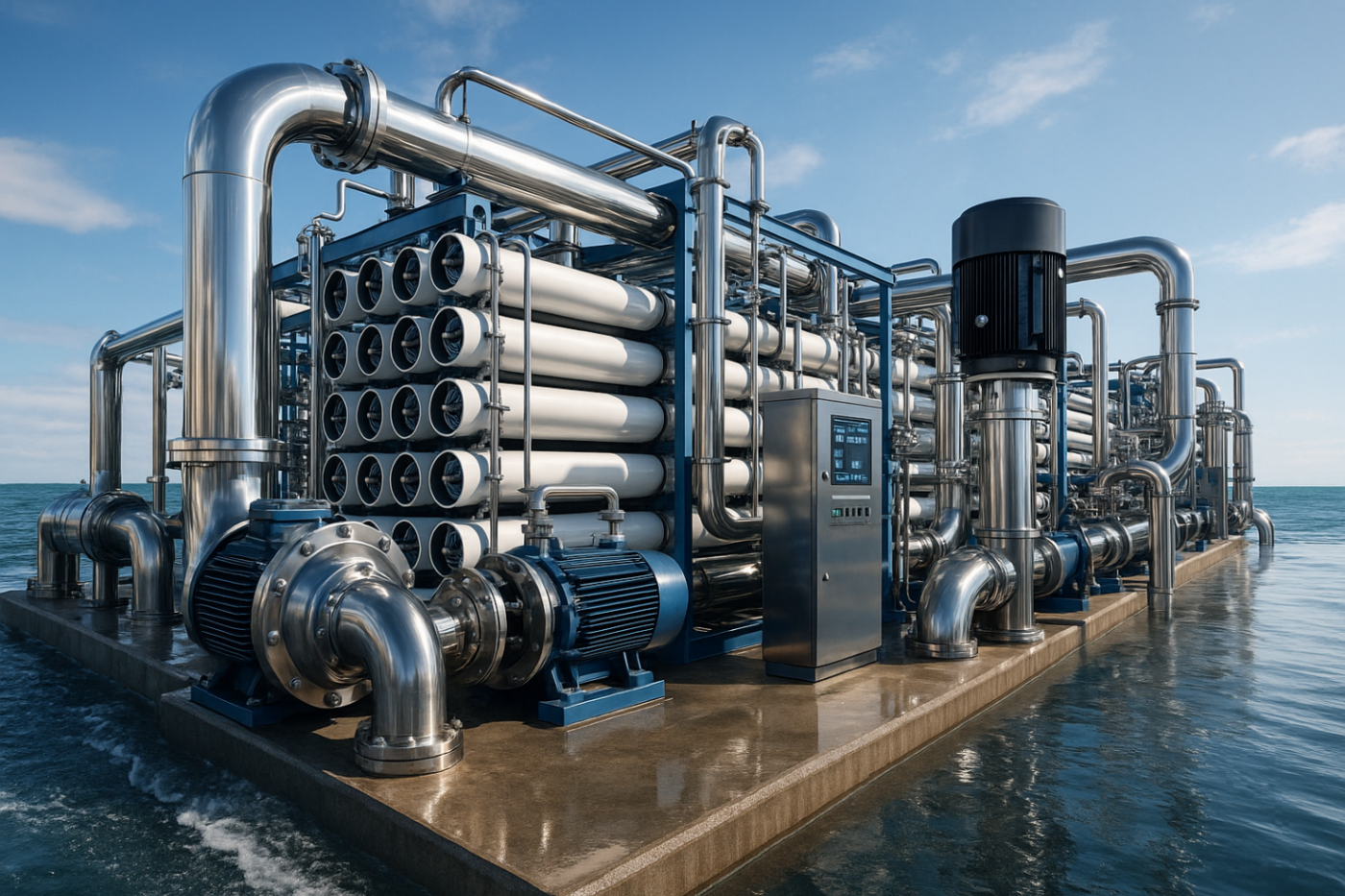
Water scarcity has long been one of the most pressing issues in the Middle East. The region’s arid climate, coupled with a growing population and limited natural freshwater resources, has posed significant challenges to securing reliable and sustainable water supplies. To address these challenges, countries like Saudi Arabia, UAE, Qatar, and Kuwait have turned to innovative solutions, with Reverse Osmosis (RO) technology emerging as a game-changer.
Reverse Osmosis is a type of desalination that plays a pivotal role in turning seawater into potable water, significantly reducing reliance on natural freshwater sources. This technology is vital for providing clean water to populations, supporting industrial growth, and ensuring food security. As the region continues to battle water scarcity, RO systems have become an essential component of the Middle East’s water management strategy, providing sustainable and cost-effective solutions.
Water scarcity in the Middle East has been a long-standing issue, compounded by the region’s hot, dry climate and lack of sufficient freshwater resources. Saudi Arabia, UAE, Qatar, and Kuwait are among the countries most affected by water scarcity, and they face significant challenges in meeting the water needs of their populations and industries.
Reverse Osmosis (RO) technology has become a vital tool in the region’s fight against water scarcity. The process works by pushing seawater through a semi-permeable membrane, which filters out salts, minerals, and other impurities, leaving behind clean, drinkable water. This process allows these countries to turn seawater, which is abundant, into freshwater that can be used for drinking, industrial purposes, and agriculture.
The growing importance of RO systems in the Middle East is reflected in the high percentage of water in the region that comes from desalination. Countries like Saudi Arabia are heavily reliant on desalination for their water supply, with a substantial portion of the country’s water coming from RO desalination plants.
For instance, the Ras Al Khair plant, located in Saudi Arabia, is the world’s largest desalination facility, producing 1,036,000 cubic meters of clean water per day. This plant, alongside others, ensures that the growing demand for water in the country is met. Saudi Arabia has plans to further expand its desalination capacity, aiming to increase its output to 8.5 million cubic meters per day by 2025. This ambitious goal highlights the critical role of RO technology in the country’s water management strategy moving forward.
The use of Reverse Osmosis extends far beyond just drinking water purification. RO systems are being implemented across the Middle East for various applications, ensuring a sustainable and reliable water supply for industrial, agricultural, and domestic needs.

Desalination plants using RO systems are the backbone of drinking water supply in many cities throughout the Middle East. With limited natural freshwater sources, countries have turned to the sea to meet their water demands. Desalination through RO technology provides a consistent and reliable source of potable water for residents.
In Qatar, for instance, the Umm Al Houl RO desalination plant is one of the largest of its kind in the region, producing 894,000 cubic meters per day, covering nearly half of the country’s water demand. Similarly, in the UAE, the Taweelah RO plant is one of the largest desalination plants in the world, capable of producing 909,000 cubic meters per day. These plants, along with others in the region, ensure a steady and safe water supply for urban populations.
Reverse Osmosis technology is not limited to drinking water production but also plays a vital role in supplying water to industrial sectors. Industries such as food and beverage production, pharmaceuticals, and petrochemicals require large amounts of water, both for their operations and as part of their manufacturing processes.
RO systems are used to treat water for industrial purposes, ensuring that industries have access to clean water while minimizing their impact on natural freshwater sources. In Dubai, the Hassyan RO plant produces 818,000 cubic meters per day, supplying both industrial water to factories and fresh drinking water to the local population. By leveraging RO systems, industries can maintain their operations while adhering to sustainability practices.
While RO technology is most commonly associated with drinking water production, it is increasingly being used for agricultural irrigation in the region’s water-scarce areas. Given the region’s limited freshwater availability, the use of RO-treated water for irrigation has become a crucial method of supporting agriculture and food security.
In Saudi Arabia, where freshwater resources for irrigation are scarce, RO systems have been implemented to treat seawater for agricultural use. This technology ensures that crops can continue to grow and thrive despite the harsh climatic conditions. RO-treated water is essential in maintaining agriculture in this region, where farming relies heavily on irrigation systems.
Similarly, other countries in the Middle East, such as Qatar and UAE, have also explored the use of RO-treated water in agriculture to support food production. This makes RO systems not just a source of drinking water but also a vital resource for food security in the region.
The economic impact of Reverse Osmosis technology in the Middle East is profound. By reducing dependence on groundwater and natural freshwater sources, RO systems have helped to preserve these limited resources for future generations. In addition, RO plants support local industries by providing a reliable, cost-effective source of water, enabling growth and sustainability.
Environmentally, RO systems are becoming more energy-efficient and sustainable. Many RO plant in the Middle East. This reduces the carbon footprint of desalination, helping countries meet their sustainability goals.
The integration of renewable energy sources into RO plants is transforming the environmental footprint of water desalination in the Middle East. Countries like the UAE are leading the way, with Dubai’s DEWA (Dubai Electricity and Water Authority) aiming to power 100% of its desalination plants with clean energy by 2030.
This shift not only reduces reliance on fossil fuels but also aligns with the region’s long-term sustainability and energy efficiency targets. As RO systems become more efficient and cost-effective, they will continue to play a crucial role in ensuring the region’s water security while also supporting its environmental goals.
Agricultural irrigation is another critical area where RO technology has made significant contributions. In water-scarce regions like Saudi Arabia, RO-treated water is being used to irrigate crops, ensuring that agriculture remains viable despite the challenges posed by limited freshwater availability.
Countries such as Qatar and UAE are also exploring ways to integrate RO technology into agriculture to support food production and sustainable farming practices. This makes RO plants not just a source of drinking water but also a vital resource for food security in the region.

Looking ahead, the future of Reverse Osmosis technology in the Middle East is promising. The region continues to invest in research and development to enhance the efficiency and sustainability of RO systems. Innovations in membrane technology, energy recovery systems, and brine management will further reduce costs and improve the environmental performance of RO desalination plants.
As the demand for clean water grows, RO systems will continue to be critical in meeting the region’s water needs. By improving energy recovery techniques and optimizing membrane efficiency, RO plants will provide an even more sustainable and cost-effective solution to the region’s water challenges.
RO technology has not only solved the immediate water scarcity problem but also provides a long-term solution for water security in the Middle East. As RO systems evolve, they will continue to offer an affordable, sustainable, and reliable solution to meet the region’s growing water demand, ensuring that future generations have access to clean, potable water.
By focusing on energy-efficient RO plants and integrating renewable energy into desalination processes, the Middle East is positioning itself as a leader in sustainable water management. The continued development of RO systems will ensure that the region remains resilient in the face of ongoing water challenges.
Scaling up RO desalination plants to meet the increasing demand for water in the Middle East presents several challenges. One of the main obstacles is the energy consumption of RO systems, which has traditionally been high. However, advancements in energy recovery devices and membrane technology have made RO plants more efficient and cost-effective.
Additionally, brine disposal, the byproduct of desalination, is another challenge that is being addressed through innovative solutions. As RO technology becomes more efficient, solutions for managing brine waste are being developed to reduce its environmental impact.
The integration of renewable energy into RO plants is transforming the desalination industry in the Middle East. As part of their commitment to reducing carbon emissions, several Middle Eastern countries are incorporating solar energy and wind energy into their RO desalination plants. This move is not only making desalination more sustainable but also helping to align with the Paris Agreement and regional sustainability targets.
In conclusion, Reverse Osmosis systems are revolutionizing water management in the Middle East by providing sustainable, cost-effective, and efficient solutions to water scarcity. Countries like Saudi Arabia, UAE, Qatar, and Kuwait have embraced this technology to meet the growing demand for clean water and support their industrial and agricultural sectors.
With continued innovations in RO technology, the integration of renewable energy, and sustainable brine management techniques, the Middle East is well on its way to becoming a global leader in water management solutions.
As the Middle East continues to invest in Reverse Osmosis systems, it is clear that RO technology will play a crucial role in ensuring water security and sustainability in the region for years to come.


Olivia : +86 15168506513
Lydia : +86 15253672282

